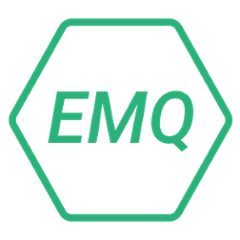ExProto Java SDK
Requirements
-
JDK 1.8+
-
Depend on erlport.jar (The communication module used in emqx-exproto-java-sdk)
SDK edition & EMQ X Broker edition
| SDK edition | EMQ X Broker edition |
|---|---|
| 0.0.2 | 4.2.0 |
| unsupport | before 4.2.0 |
Get Started
-
First of all, create your Java project.
-
See
SDK edition & EMQ X Broker editionpart. Chose your SDK edition.Depends on EMQ X Broker edition.Download the emqx-exproto-java-sdk.jar and erlport.jar.
-
Add
emqx-exproto-java-sdk.jaranderlport.jarto your project dependency.If your project is a maven project, add a dependency in your maven project
pom.xml<dependencies></dependencies>.<dependency> <groupId>io.emqx</groupId> <artifactId>emqx-exproto-java-sdk</artifactId> <!-- Chose your SDK edition.Depends on EMQ X Boker edition. --> <!-- Change version to your chosen SDK edition --> <version>version</version> </dependency>
Change
<version>version</version>to your chosen SDK edition, like<version>0.0.1</version>. -
Copy
example/ExProtoHandlerDemo.javainto your project. -
Try to compile your project.
Note: NOT read/write System.out and System.in stream. They are used to communicate with EMQ X. Note: Invoke ExprotoSDK.loadExprotoHandler(AbstractExprotoHandler handler) load your AbstractExprotoHandler in the Nonparametric construction method.
Deploy
After compiled all source codes, you should deploy the sdk and your class files into EMQ X.
-
Copy the
emqx-exproto-java-sdk.jartoemqx/data/extensiondirectory. -
Copy your class files, e.g:
ExProtoHandlerDemo.classtoemqx/data/extensiondirectory. -
Modify the
emqx/etc/plugins/emqx_exproto.conffile. e.g:exproto.listener.protoname = tcp://0.0.0.0:7993 exproto.listener.protoname.driver = java exproto.listener.protoname.driver_search_path = data/extension exproto.listener.protoname.driver_callback_module = ExProtoHandlerDemo -
Execute
bin/emqx consoleto start EMQ X and load theemqx_exprotoplugin. -
Use
telnet 127.0.0.1 7993to establish a TCP connection and observe the console output.
Examples
see: examples/ExProtoHandlerDemo.java.
examples/ExProtoHandlerDemo.java useage see java-sdk-quick-guide.md.
Interface
The AbstractExProtoHandler provide a series of interfaces, that is an encapsulation for emqx-exproto.
Callbacks
Connection Layer callbacks (The Connection object represents a TCP/UDP Socket entity):
// This function will be scheduled after a TCP connection established to EMQ X
// or receive a new UDP socket.
public abstract void onConnectionEstablished(Connection connection, ConnectionInfo connectionInfo);
// This callback will be scheduled when a connection received bytes from TCP/UDP socket.
public abstract void onConnectionReceived(Connection connection, byte[] data);
// This function will be scheduled after a connection terminated.
//
// It indicates that the EMQ X process that maintains the TCP/UDP socket
// has been closed. E.g: a TCP connection is closed, or a UDP socket has
// exceeded maintenance hours.
public abstract void onConnectionTerminated(Connection connection, byte[] reason);
Pub/Sub Layer callbacks:
// This function will be scheduled when a connection received a Message from EMQ X
//
// When a connection is subscribed to a topic and a message arrives on that topic,
// EMQ X will deliver the message to that connection. At that time, this function
// is triggered.
public abstract void onConnectionDeliver(Connection connection, DeliverMessage[] messagesArr);
APIs
Similarly, AbstractExprotoHandler also provides a set of APIs to facilitate the use of the emqx-exproto APIs.
Connection Layer APIs:
// Send a stream of bytes to the connection. These bytes are delivered directly
// to the associated TCP/UDP socket.
public static void send(Connection connection, byte[] data) throws Exception;
// Terminate the connection process and TCP/UDP socket.
public static void terminate(Connection connection) throws Exception;
Pub/Sub Layer APIs:
// Register the connection as a Client of EMQ X. This `clientInfo` contains the
// necessary field information to be an EMQ X client.
//
// This method should normally be invoked after confirming that a connection is
// allowed to access the EMQ X system. For example: after the connection packet
// has been parsed and authenticated successfully.
public static void register(Connection connection, ClientInfo clientInfo) throws Exception;
// The connection Publish a Message to EMQ X
public static void publish(Connection connection, DeliverMessage message) throws Exception;
// The connection Subscribe a Topic to EMQ X
public static void subscribe(Connection connection, String topic, int qos) throws Exception;
License
Apache License v2
